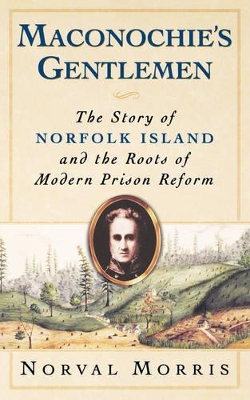Studies in Crime and Public Policy
1 total work
In 1840, Alexander Maconochie, a privileged retired naval captain, became at his own request superintendent of two thousand twice-convicted prisoners on Norfolk Island, a thousand miles off the coast of Australia. In four years, Maconochie transformed what was one of the most brutal convict settlements in history into a controlled, stable, and productive environment that achieved such success that upon release his prisoners came to be called "Maconochie's Gentlemen".
Here Norval Morris, one of our most renowned criminologists, offers a highly inventive and engaging account of this early pioneer in penal reform, enhancing Maconochie's life story with a trenchant policy twist. Maconochie's life and efforts on Norfolk Island, Morris shows, provide a model with profound relevance to the running of correctional institutions today. Using a unique combination of fictionalized history and critical commentary, Morris gives this work a powerful policy impact
lacking in most standard academic accounts.
In an era of "mass incarceration" that rivals that of the settlement of Australia, Morris injects the question of humane treatment back into the debate over prison reform. Maconochie and his "Marks system" played an influential role in the development of prisons; but for the last thirty years prison reform has been dominated by punitive and retributive sentiments, the conventional wisdom holding that we need 'supermax' prisons to control the 'worst of the worst' in solitary and harsh
conditions. Norval Morris argues to the contrary, holding up the example of Alexander Maconochie as a clear-cut alternative to the "living hell" of prison systems today.
Here Norval Morris, one of our most renowned criminologists, offers a highly inventive and engaging account of this early pioneer in penal reform, enhancing Maconochie's life story with a trenchant policy twist. Maconochie's life and efforts on Norfolk Island, Morris shows, provide a model with profound relevance to the running of correctional institutions today. Using a unique combination of fictionalized history and critical commentary, Morris gives this work a powerful policy impact
lacking in most standard academic accounts.
In an era of "mass incarceration" that rivals that of the settlement of Australia, Morris injects the question of humane treatment back into the debate over prison reform. Maconochie and his "Marks system" played an influential role in the development of prisons; but for the last thirty years prison reform has been dominated by punitive and retributive sentiments, the conventional wisdom holding that we need 'supermax' prisons to control the 'worst of the worst' in solitary and harsh
conditions. Norval Morris argues to the contrary, holding up the example of Alexander Maconochie as a clear-cut alternative to the "living hell" of prison systems today.
